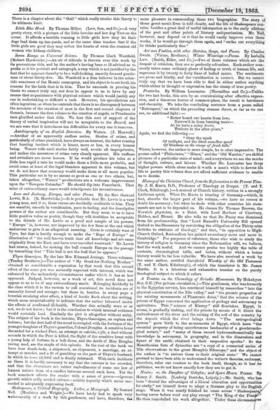Thyra Gascoigue. By the late Mrs. Edmund Jenings. Three volumes.
(Tinsley Brothers.)—The author of "My Good-for-Nothing Brother" ebtained so considerable a reputation by that work that this second -effort of the same pen was naturally expected with interest, which was enhanced by the Melancholy circumstances under which it has at last appeared. Judged, however, as a work of art, this novel does not appear to us to be of any extraordinary merit. Belonging decidedly to the class which it is the custom to call sensational, its incidents are of necessity forced and strange ; but thero is, besides, in every page a feverish straining after effect, a kind of hectic flush about the writing, which seem unmistakeably to indicate that the author laboured under the effects of confirmed ill-health. Whether this actually wore so or not, we do not know ; but it is the conclusion to which internal evidence would certainly load. Similarly the plot is altogether without unity. The subject of the book is the heroine, Thyra Gaseeigne, an orphan and heiress ; but the first half of the novel is occupied with the fortunes of the younger daughter-of Thyra's guardian, Colonel Douglas. A sensitive lover discarded for a wicked Peer, an attempt at suicide, a jilt, a duel without seconds in which the Peer is killed, the flight of the senaitivo lover with a young lady of fortune in a ball dress, and the death of Miss Douglas raving mad, are the staple of this episode. In the rest of the book we have four death-beds, a shipwreck, an elopement, a marriage, an at- tempt at murder, and a fit of gambling on the part of Thyra's husband, In which he loses 12,000/. and is finally reformed. With such incidents as those it is hardly necessary to say that the canvass is too crowded, and that the characters aro rather embodiments of some one law of human nature than of a conflict between several such laws. Yet the book somehow affects the reader with a sense of power—vigorous growth which sadly needed culture—artistic capacity which never suc- ceeded in adequately expressing itself.


































 Previous page
Previous page